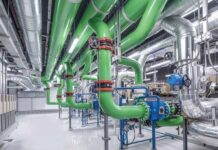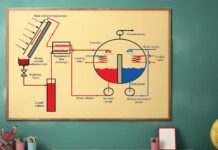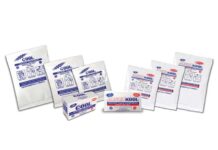
Use of potable water has more than doubled over the past 50 years, and many fear that we are coming close to a frightening breaking point, a world where chronic water shortages for farmers, businesses and people is the norm. Access to clean water has emerged as a critical issue aff ecting economic activity, development, and business around the world. Increasing regulatory pressures, climate change, aging and failing infrastructure, growing focus on social responsibility, and concern for environmental are forcing organizations to reassess the impact of water management on their economic wellbeing. Not just for a drop to drink, but for having the know how to manage it smarter in the first place.
Every time we interact with water, we change it, redirect it or otherwise alter its state. As a result, the nature of the water we get and have is continually changing – from rainfall to ocean. The chemical composition of water around us is fluctuating and these risky changes are forcing us to ask some thought provoking questions about how we use and abuse it.
Recognizing these concerns, organizations are undertaking major programs to realign their water use with the larger humanitarian interests. But while objectives like being “water neutral” and mapping of “footprint” — tracking the use of water throughout the supply chain — are ambitious, what is being done to achieve them? And its exactly in this context that Godrej and its initiatives with respect to water, comes into the picture.
Water Management at Godrej
As commitment towards environmental sustainability, Jamshyd Godrej, CMD Godrej & Boyce is one of the signatories to ‘CII – Mission on Sustainable Growth’ (MSG) program across the Industry. It is a purely voluntary initiative launched in 2009 which addresses 10 commandments like specifi c reduction in Energy, Water, Waste, Carbon emissions etc.
An ambitious target has been set for reduction in specific water consumption by 40% (over the base year of 2010) and we aim to be a ‘Water Positive’ company by 2020.
Even though the MSG program was started in 2009, the water management program in Godrej started off two decades earlier in 1986. A brief history is provided below:
1986: First Common ETP (Effl uent Treatment Plant) of capacity 70 M3/day commissioned for treating and recycling wastewater generated from various manufacturing activities at the Vikhroli campus.
1989: First STP (Sewage Treatment Plant) of capacity 300 M3/day commissioned for recycling sewage water from industrial premises to reduce the sewage load and dependence on Municipal water supply and make available treated wastewater for use in landscaping for the industrial premise.
Both the above mentioned initiatives at that point of time were purely voluntary.
1996 again, owing to success of the implementation and the visual gains of the fi rst STP a second STP of similar capacity was commissioned for recycling sewage water from the township which was further augmented to 750 M3/day in 2010 as the demand for recycled water rose.
2010: We achieved ‘Water Neutrality’ i.e. the quantity of water recycled and harvested is equal to the quantity of fresh water consumed.
2014: We became ‘Water Positive’ i.e. the quantity of water recycled and harvested is greater than the quantity of fresh water consumed.

A structured Water Management Programme was initiated in 2010, addressing the challenges of water usage effi ciency, ageing infrastructure and proactive water-related risk management by leveraging the available resources’ and generating newer ones. Today, we measure, monitor and analyze entire water supply systems – from reservoirs to our industrial and residential premises. But that’s just the fi rst step. The umbrella initiative of Water Management has around 45 large, medium and small projects in its scope.
- Recycling of treated industrial effluents to achieve ‘zero discharge’
- Using of recycled and ground water for cooling applications instead of using potable water
- Using of cooling tower drain water for gardens
- Using recycle water for ready mix concrete production
- Enhancing effi ciency of well water pumping system
- Augmenting old and available water resources for larger supply of water
- Sewage treatment and recycling plant with exclusive distribution network for use of treated water for flushing of toilets in residential colonies
- Harvesting of rainwater comprehensively to augment ground water resource.

Considering the humongous setup in Vikhroli and other commercial and industrial setups across the country the total water footprint is approximately 45 lakh litres/ day. Around 50% of this total requirement is sufficed through recycled water in Vikhroli whereas the same is above 45% combined across all manufacturing locations in the country. The past 3 years trend shows a clear increase in the contribution of recycled water in the overall water footprint.
2010: We achieved ‘Zero Discharge’, for industrial activities in Vikhroli by effectively treating and recycling of industrial effluent generated through various activities.
Recycled Water Usage: Mfg. processes, Landscaping, Flushing etc. : 20 lakh ltrs/day
Cooling Tower applications: 3 lakh ltrs/day
RMC production: 3 lakh ltrs/day.
We take pride in acknowledging that not only have we taken various initiatives in our manufacturing and commercial operations and units, but also in our residential colonies in Vikhroli. One among the many is the construction of sewage and recycling plant with a distribution network for using it for flushing of toilets in our residential colonies, which reduces about 5 lakh litres/ day of good potable water use. Other very significant initiative which has been taken is the Rainwater Harvesting.
Rainwater harvesting by recharging the ground water aquifers has been taken up at various locations within the Industrial Garden township of Pirojshanagar in Vikhroli resulting in a net recharging of more than 30% of the annual fresh water consumption of the setup.

Achievements & Future Plans
All the above great eff orts put in by the organization has resulted in the Godrej & Boyce achieving ‘Water Positive’ status ending 2014. Achievement of 100% off setting by recycling and replenishing since 2011 has been a great motivating factor for our team. However, the real challenge lies in maintaining & continuously improving our performance to ensure that we remain a ‘Water Positive’ company.
Conclusion
The need of the hour is not only to recognize the water problems as already being apparent, instead of a potential threat in the future, but also to act upon that recognition. Unless solutions are found at the micro and macro levels simultaneously, in a country the size of India, it is unlikely that this serious and looming threat will be resolved. We at Godrej have turned this threat into an opportunity for discovering and implementing innovative ideas for management of this most critical resource in the most efficient manner. With our in-house experience and expertise, we are positioned to offer the benefit of this knowledge to all the future developments that embark on this journey of water efficiency. Finally it would be apt to conclude with a beautiful message from Ban Ki-Moon, Secretary General, United Nations, from his speech at The World Economic Forum in 2008, “As the global economy grows, so will its thirst. This is not an issue of rich or poor, north or south. All regions are experiencing the problem of water stress. There is still enough water for all of us but only so long as we keep it clean, use it more wisely and share it fairly.”









